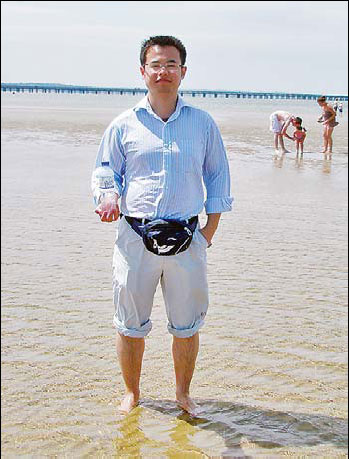Reasons to love a low-carbon lifestyle
 |
| Jiang Qijia is a 26-year-old visitor from Shanghai. He holds a master's degree in Risk and Stochastics from the London School of Economics. |
The Expo 2010 Shanghai has impressed me with its efforts to promote a low-carbon lifestyle aimed at furnishing us with a "Better City, Better Life" at a lower cost.
At the Urban Best Practices Area on the Puxi side, I see that most of the case pavilions include ways that people can cut their carbon emissions in their displays. The methods range from recycling garbage, to using water instead of air-conditioners to control the temperature, to using more ecologically friendly materials, to using edible forks and chopsticks made from flour and chocolate.
People never attached so much importance to the idea of leading a low-carbon lifestyle as they do now. Financial products that encourage people to cut their carbon emissions are functioning well for their cause. Environmentally friendly enterprises and countries will also benefit from selling carbon credits, or the quota of carbon dioxide equivalent emissions.
As of the end of 2009, 187 states including China have signed the Kyoto Protocol, a pact that has a flexible mechanism enabling countries to trade in carbon-dioxide-equivalent emissions. So we can see that behind the low-carbon lifestyle lies a huge market in carbon financing.
It is no wonder that people love to see the wicker-skinned Spain Pavilion, the acrylic-fabric of the UK Pavilion or the refurbished manufacturing plants in the Urban Best Practices Area. These pavilions educate people about living in more environmentally friendly ways that lead to healthier lifestyles while allowing businesses and countries to trim costs.
The benefits can be real and rich. A wind farm in Cixi, Zhejiang province, was recently listed on a carbon exchange market in the UK and received 600,000 euros ($827,000) in August from selling its carbon emissions.
Throughout the history of the World Expo, we see the continuous effort of people to realize their dreams. These dreams can later be commercialized and made affordable for the masses.
The Expo 2010 Shanghai provides solutions to countries like China, which is developing at breakneck pace while facing great environmental pressure. The technologies on display now may be widely used in the future, not only on wind farms, but in the comfort of your bathroom or kitchen.
I tried the edible plates at the London Case Pavilion's zero-carbon restaurant, during which time I saw many other diners doing the same, despite the fact that the cutlery was much less tasty than the food it was serving.
These kind of things will slowly be accepted and cherished as people come to accept a low-carbon lifestyle powered by carbon financing.
 0
0 






